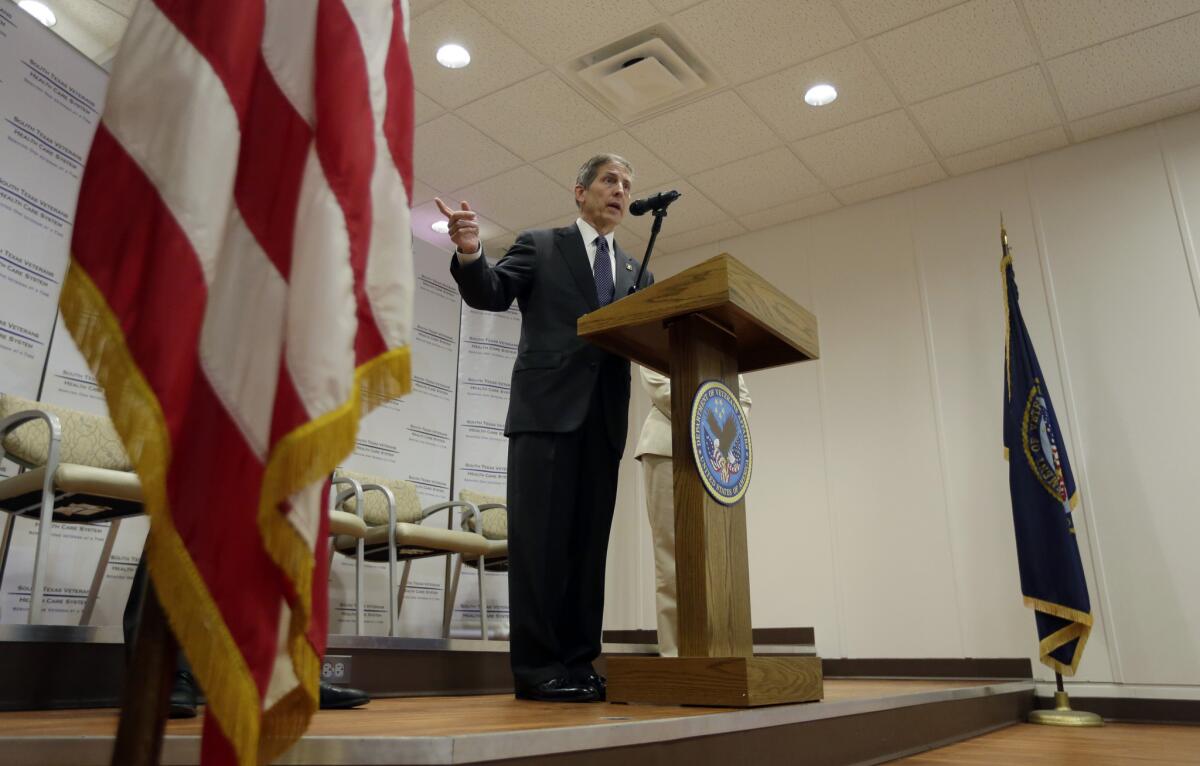More details from audit of VA healthcare scandal expected Monday

As the acting secretary of Veterans Affairs tries to assure congressmen that he is moving to address the VA healthcare scandal, his department is preparing to release more results of a nationwide audit of scheduling practices that have been denounced as misleading and harmful to veterans.
The results are expected to be released Monday, as a House committee puts VA officials through another round of grilling over findings that VA employees falsified records to conceal long waits for medical appointments.
The challenges facing Acting VA Secretary Sloan Gibson in turning around his department’s massive healthcare system were apparent Friday early in his meeting with three Texas congressmen at the Audie L. Murphy VA Medical Center in San Antonio.
Rep. Lamar Smith told Gibson about a veteran who said he has been waiting more than two years for an appointment for oral surgery.
Smith, a Republican whose district includes the VA hospital, said that Gibson was appalled to hear about the veteran’s wait and promised to get in touch with him. Smith said Gibson also spoke movingly about wanting to fix the VA’s bigger problems.
“Now we need to see the action,” the congressman said in an interview.
The VA scandal moves to center stage on Capitol Hill next week, with the House Committee on Veterans’ Affairs due to hear Monday night from the inspector general and the Senate expected to take up a bill aimed at reducing veterans’ waits for healthcare.
The inspector general last week issued an interim report that sparked national outrage by finding a systemic problem nationwide in scheduling veterans for healthcare in a timely manner, including instances of VA staff falsifying records to cover up long waits. A final report is expected in August.
The VA has been conducting a separate audit of scheduling practices of VA facilities. The preliminary results, released May 30 after VA Secretary Eric K. Shinseki resigned, found that 13% of the scheduling staffers received instructions to enter a date different from the one requested by the patient. In some cases, “pressures were placed on schedulers to utilize inappropriate practices in order to make waiting times appear more favorable,” the audit found.
Rep. Joaquin Castro, one of the three congressmen who met with Gibson on Friday, said in an interview that the acting secretary made it clear he is “serious about reforming the culture at the VA” and holding employees accountable for their actions.
Castro, a Democrat, said that he told Gibson he should be “very demanding of Congress and be clear about what they need to do their job,” saying that “part of the reason that some of these employee were gaming the scheduling system is because they feel overwhelmed.”
Rep. Pete Gallego, a Democrat who also met with Gibson, said in a statement that he made it known he was angry “that there are still improvements needed in getting veterans access to care.”
Although the Phoenix VA, which Gibson visited Thursday, has been at the center of the scandal, veterans facilities in San Antonio, Austin and Waco are under investigation; a survey released this week said veterans have had to wait more than two months on average for mental health treatment at the El Paso VA and more than one-third never received the care.
Kansas lawmakers complained Friday that VA officials haven’t answered their questions about reports of unauthorized waiting lists at the Wichita VA.
“We now have more questions than answers regarding the scheduling practices used behind closed doors at the Wichita VA facility,” said Rep. Tim Huelskamp (R-Kan.), who got some answers out of the VA but only after showing up unannounced at the facility Wednesday with a television crew.
In the meantime, veterans groups were waiting to review Senate VA reform legislation, which was still being drafted.
The legislation would allow veterans facing long waits at VA facilities to seek care from private doctors; expand the VA secretary’s authority to fire or demote staffers for poor performance; establish 26 new VA health facilities in 18 states, including California; and provide $500 million to hire new VA doctors and nurses.
“In the current political environment, it’s nice to see the Congress come together on some form of compromise,” said Garry Augustine, executive director of the Disabled American Veterans’ Washington office.
He added: “We hope that now that both the Congress and the president have committed to make positive change in the system, they will be willing to take a close look at what is needed in terms of resources and support for a system we believe has been underfunded for many years.”
More to Read
Sign up for Essential California
The most important California stories and recommendations in your inbox every morning.
You may occasionally receive promotional content from the Los Angeles Times.











